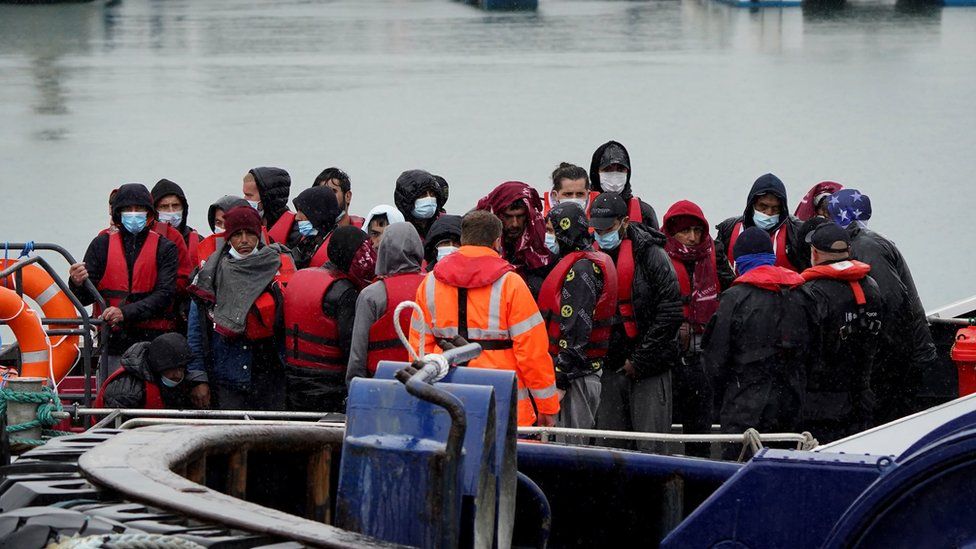ARTICLE AD BOX
By Dominic Casciani
Home and legal correspondent
 Image source, PA Media
Image source, PA Media
The UN's refugee agency warned the Home Office twice that its arrangement to send asylum seekers to Rwanda was unlawful, the High Court has heard.
A lawyer for the agency made the claim as a legal challenge to stop the process got under way.
The government aims to discourage people crossing the English Channel to seek asylum by making it clear many cases will now be dealt with by Rwanda.
About 100 people have been told they may be on the first flight, on Tuesday.
Just before the start of the hearing, it emerged at least three people have been told they will not now be put on that flight.
Home Office lawyers told the court the plan must not be stopped by legal challenges because it was in the public interest and also urged a judge to reject challenges on behalf of individual asylum seekers.
The hearing centres on the Home Office's deal with Rwanda to send some asylum seekers there to have their claims dealt with.
While their application is considered by the east African country they will be given accommodation and support and, if successful, will be able to remain in Rwanda with up to five years' access to education and support.
Those who fail in their asylum bids in Rwanda will be offered the chance to apply for visas under other immigration routes if they wish to remain in the country, but could still face deportation.
In practice, the policy is targeted at English Channel crossings, with more than 10,000 so far this year.
The case brought against the Home Office by a coalition of campaigners has two stages.
Firstly, the claimants want to block the removal to Rwanda of specific individuals who have been told they are leaving.
Secondly, they want to challenge the lawfulness of any such transfers to Rwanda.
An excerpt of the document given to the asylum seekers by the Home Office to inform them they will be flown to Rwanda on 14 June
Laura Dubinsky QC, representing the UN refugee agency, told the court "in light of inaccuracies" she wanted to clarify that it in no way endorsed the UK-Rwanda arrangement.
The UNHCR has responsibility for oversight of international refugee law and institutional expertise.
Ms Dubinksy said two meetings between the agency and the Home Office took place in April - one in UK, the other in Rwanda - at which concerns were raised.
"At those April meetings, capacity issues and specific recent incidents of refoulement were raised by UNHCR," she said.
Refoulement is the practice of forcibly returning refugees or asylum seekers to a country where they are liable to be subjected to persecution. It is illegal under international law.
She said the UNHCR had informed the Home Office that the risk of refugees being refouled by Rwanda meant the scheme was unlawful.
The lawyer added that the agency was concerned about the risk of "serious, irreparable harm" caused to refugees sent to Rwanda, emphasising the body "in no way endorses the UK-Rwandan arrangement".
In papers lodged with the High Court, lawyers for the Home Office said: "Removal to Rwanda pursuant to the migration and economic development partnership [with Rwanda] under the inadmissibility provisions of the immigration rules pursues an important public interest.
"Removals of individuals from the UK in accordance with the MEDP are intended to deter people from making dangerous journeys to the UK to claim asylum, which are facilitated by criminal smugglers, when they have already travelled through safe third countries.
"In particular, but not exclusively, this is aimed at deterring arrivals by small boats.
"It is striking that nowhere in the claimants' submissions [to stop the flight] is there any consideration of the impact of any public interest factors, still less any analysis or balancing of the importance of the public interest being pursued in this regard."
Raza Husain QC, representing some of the claimants, also raised in court the UNHCR's concerns about shortcomings in the Rwanda asylum system.
He said the agency's concerns included evidence that applicants for refuge could be arbitrarily denied proper access to a hearing, a lawyer and an interpreter - and could even find themselves removed to countries that torture.
The UN had not been able to properly monitor the quality of decision-making in the country despite Home Secretary Priti Patel's claims that Rwanda was safe, he said.
Mr Husain continued: "These are concerns that have been communicated to the UK authorities and yet the secretary of state's position is that the UN is giving this plan a green light. That is a false claim.
"This is not the view of a very reputable NGO - it is the view of the UNHCR and it is entitled to very significant weight."
The lawyer added: "We are not on the ground in Rwanda, the secretary of state is not on the ground in Rwanda," he said, adding: "The UNHCR is. How could you possibly implement a removal when the UNHCR has said this?"
Mr Justice Swift told the court the judicial review of the entire policy was likely to be complete within six to eight weeks.

 2 years ago
39
2 years ago
39








 English (US)
English (US)